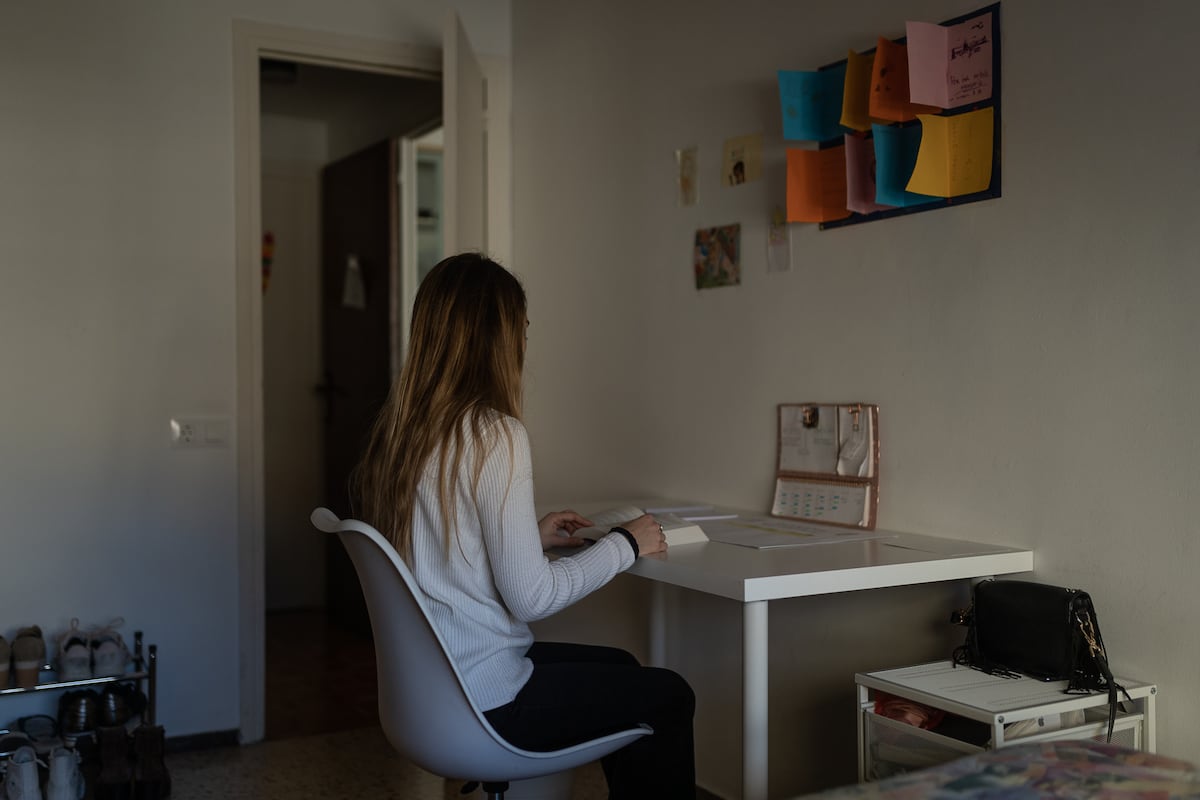Núria García was 11 years old when she entered a hospital for the first time, the one in Lleida, to combat anorexia.
It was the beginning of a five-year journey in which she had to deal with a series of relapses promoted, in large part, by the content she saw on social networks.
She defines them as a showcase of perfect bodies: "To achieve it, you lose all your happiness and all your life," she concludes.
It is not your perception.
Isabel Martínez, a psychologist at the Association in Defense of Anorexia Nervosa and Bulimia (Adaner), is clear that these tools, which greatly facilitate communication, can be a "springboard" to eating disorders (TCA). if they are not used properly.
Talking about body weight, diets and foods that are fattening or not, is very common outside of social networks, says the psychologist.
But if this type of speech is also present permanently and people -especially adolescents- can find it "from the time they get up until they go to sleep", it is inevitable that someone with eating disorders spends the whole day thinking about it, she maintains.
A study published last November in the magazine
PLOS ONE
analyzed the content of TikTok in the United States related to food, nutrition and weight.
44% of the videos investigated offered weight loss content and 20% explicitly showed a person's body transformation.
The hashtag #WeightLoss alone had more than 10 billion views when the study collected the data.
To get those perfect bodies you lose all your happiness and all your life."
Nuria Garcia
Adolescents are the most at risk when they consume this type of publication.
Sara Bujalance, director of the Association against Anorexia and Bulimia (ACAB), explains that they do not have the capacity of an adult to protect themselves from this information: "They are not really critical and this content has a greater impact on their self-esteem."
Núria García, who is now 22 years old, recognizes herself in that statement.
She, she says, was not able to observe that what she saw on the networks "many times is not real, that they are retouched, and that these bodies are not healthy, they are pathological."
This type of content is not dangerous solely for displaying unrealistic physical perfection.
Many of the publications offer nutritional advice, lifestyle advice, even tips to overcome hunger and lose weight, such as chewing gum or drinking lemon water.
Furthermore, according to the TikTok study, only 1.4% of the videos used in the research were made by registered dietitians.
These behaviors can lead to an eating disorder, since those who suffer from them do not usually relate well to food, says Azahara Nieto, a nutritionist specializing in these disorders.
“[These conducts] are based on the prohibition;
these people usually go hungry, end up having a lot of anxiety and can end up with binge eating disorder,” she adds.
A review of international studies on the influence of social networks on anorexia and bulimia in adolescents, carried out with data from nine international investigations and more than 2,000 young people, shows that eating disorders are the third cause of illness in adolescents after of obesity and asthma.
"Due to social comparison, the continuous and continuous use of social networks can negatively impact people with difficulties in self-acceptance and belonging to a group, which increases the risk of depression and low self-esteem," explains the study, published last year. August in
Anales del Sistema Sanitario de Navarra
Núria García explains that she followed influencers
on social networks
, famous people who dealt with these issues, which hurt her even more.
Bujalance defines these behaviors as a pattern that even amounts to "torture" for people with eating disorders.
That's how it was for García, who, as she explains, she thought: "Look how beautiful she is and I can't make it, even if she doesn't eat."
Instagram was always present in her life, even if she didn't use it.
“If I went out with my friends and they talked about some gorgeous girl, that already made me obsessed,” she says.
More information:
Irritability and lower school performance: the consequences of 20% of adolescents not having breakfast before going to class
The young woman found peace during admissions because she did not have access to the mobile phone or the networks: "You are not exposed to that pressure and, since everyone is in a situation similar to yours, overcoming it is much easier," she explains .
However, when she left the hospital, everything started again and, although she proposed not to use the networks, social pressure pushed her back to them.
"You already have enough low self-esteem that later you are the
weirdo
, the only one who does not see these accounts," she says.
91% of young people between the ages of 8 and 17 use social networks on a regular basis, according to a report published last February by the Carat media agency.
They use them for an average of three hours during the week and five on weekends and, although you have to be at least 13 years old to be able to access these networks -according to their regulations-, the average age of access is 12, says the study .
Martínez, Bujalance and Nieto agree in stating that they are increasingly seeing younger patients, especially women.
Of every 10 cases of eating disorders, nine correspond to girls.
The Adaner psychologist says that, before the covid pandemic, the average age of the people who attended was around 20 years.
“Now we have greatly increased the number of families that call us for girls between the ages of 11 and 13,” she says.
For the director of ACAB, the two main reasons are early puberty and early access to the networks.
In ACAB they treated 2,000 cases before confinement;
now there are almost 5,000 currently, says its director.
Epidemiological data showed that, before the pandemic, 5% of the female population suffered from eating disorders;
"Now it is estimated that this percentage has risen to 8 or 10%," says Bujalance, who also points out that these disorders are becoming more virulent, develop and worsen faster than before.
We have greatly increased the number of families who call us for girls between the ages of 11 and 13
Isabel Martínez, ADANER psychologist
Education as the only solution
The three experts agree that the only tool to combat this problem is education.
Martínez explains that the most important thing is to teach the youngest to be critical of what they see so that they don't believe it as it is and know how to recognize manipulated or filter-enhanced content.
For Nieto, the only way to protect them is to "make them aware so they don't follow these types of accounts."
Núria García managed to break the loop she found herself in after her last admission, which was in one of the Ita group centers in Barcelona, and lasted for a year.
It was when they treated the emotional part of her disorder the most, something essential to be able to leave it behind.
In addition, she did not have access to the mobile phone or, therefore, to social networks, she says.
When she was able to return home and had them within her reach again, she realized that all that kind of content was no longer a part of her life, nor did she want it to be.
Parallel to her therapeutic process, she was realizing that this consumption was not healthy for her: "Little by little I stopped following these types of accounts and became more critical of the content I saw."
Now he does not use these media for more than half an hour a day and, in addition to his friends, he follows accounts that talk about psychology —a career that he has just finished— and others that parody the nutritional advice that previously obsessed him, or that claim the validity of all kinds of complexions without them having to be judged.
"They help me because they break with the stereotype of the perfect body on the Internet and the messages make me reflect," she says.
You can follow
EL PAÍS Salud y Bienestar
on
,
and
.








/cloudfront-eu-central-1.images.arcpublishing.com/prisa/UGT3A2CDINB3LN3NMTZ4RJJOTU.jpg)






